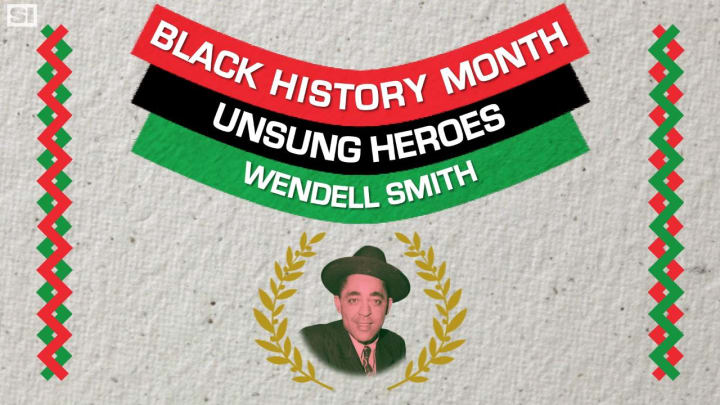Black History Month: Wendell Smith Changed The World of Sports One Column at a Time

This February, Sports Illustrated is celebrating Black History Month by spotlighting a different iconic athlete or group of athletes every day. Today, SI looks back on the legacy of Wendell Smith.
The writer Wendell Smith helped integrate baseball, though he often had to sit in the stands instead of the press box, where he wasn't always welcome as an African American.
As sports editor for the Pittsburgh Courier, Smith wrote column after column admonishing professional sports leagues for discriminating against people of color.
"Major League Baseball is perpetuating the very things thousand of Americans are overseas fighting to end, namely, racial discrimination and segregation," he wrote in 1942.
And in it was in that same role where he served as the initial liaison between Jackie Robinson and Branch Rickey and the Brooklyn Dodgers.
"No player in history has tried harder to become a big leaguer," Smith wrote in a column in 1947. "If Jackie Robinson fails to make the grade, it will be many years before a Negro makes the grade. This is IT!"
Smith pushed hard to get Jackie into MLB. Smith wrote stories promoting a variety of African-American superstars in the Negro Leagues. He organized workouts with MLB teams, including one with the Boston Red Sox in 1945, where he brought three players: Marvin Williams, Sam Jethroe and a speedy shortstop from the Kansas City Monarchs—Jackie Robinson.
The tryout ended up being a farce, though. The Red Sox brought low-level minor leaguers to throw to the three. No one from the club took the session seriously. Nothing came out of it.
More From Biography.com
• Florence Griffith Joyner
• Jackie Joyner-Kersee
• Wilma Rudolph
• Althea Gibson
But it led to a phone call from Rickey, the president of the Dodgers. It was a feeler call. Rickey was slightly hesitant, but Smith helped sway him. The two came to an agreement—Rickey would send a scout to follow Robinson's progress with the Monarchs and he'd make his decision afterward.
The scout tailed Robinson for nearly a full season. Smith continued to advocate throughout.
In the end, Rickey was thoroughly impressed. He and the Dodgers signed Robinson to a minor-league contract and signed Smith to a similar deal in order to serve as Robinson's companion on the road. Smith set up housing for the two at every road city. He connected Robinson to leading African-American advocates and communities. He was a friend and a mentor.
For $50 a week, Smith—on the club directory as a scout—aided in Robinson's arduous transition to the major league. With his various responsibilities for the Dodgers, Smith still managed to maintain a column with the Courier, where he tracked Robinson's day-to-day, making sure to emphasize his high-character moral compass and humility for a skeptical, white audience.
Even facing virulent racism and systemic discrimination—they couldn't stay at the same places as the rest of the minor-league team—the two made history. Robinson was called up to the big leagues in 1947.
